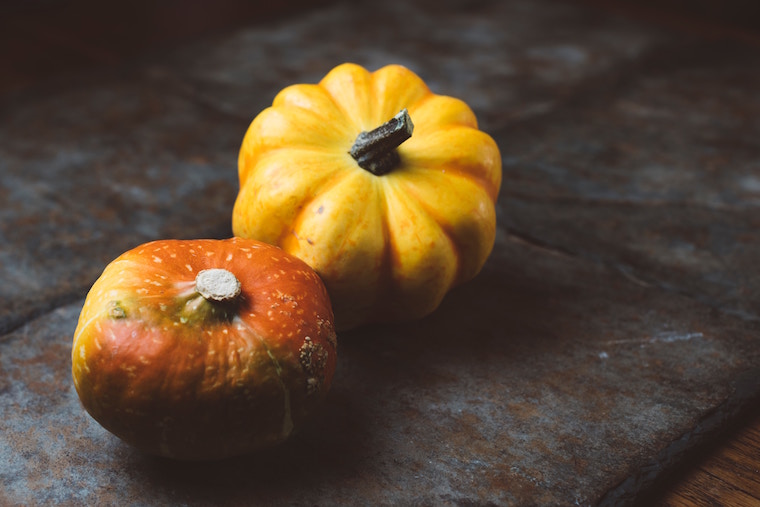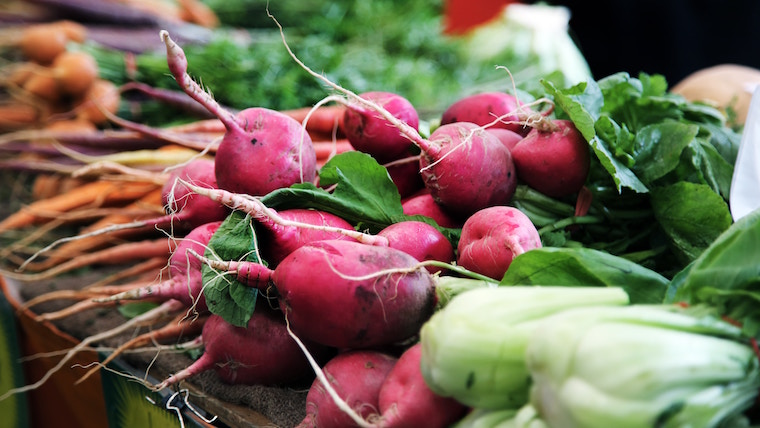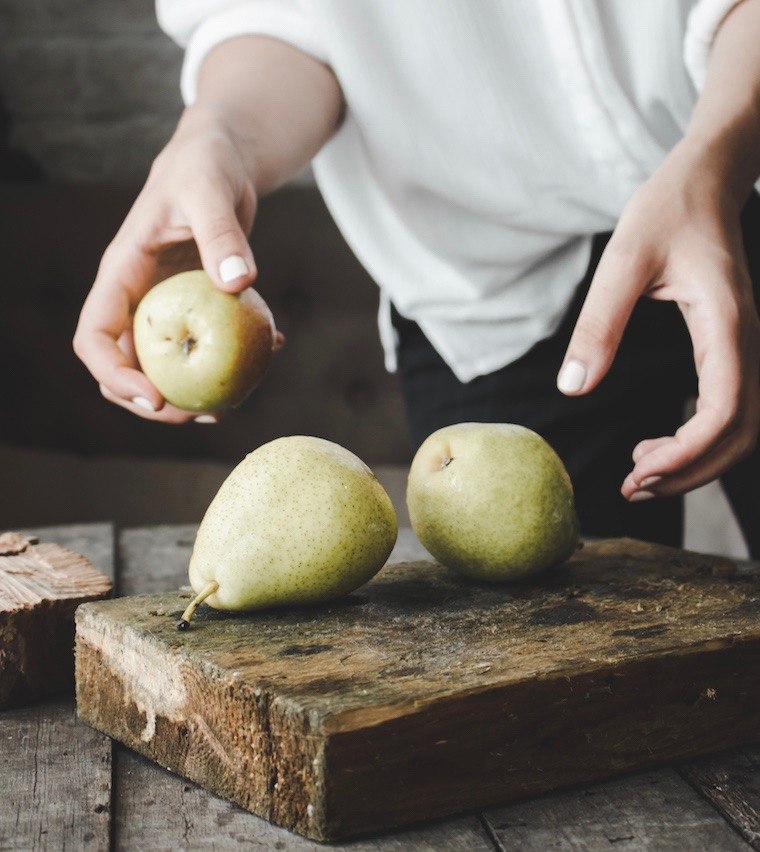This One Diet Change Will Lessen Your Anxiety, Kimberly Snyder Says
When that oh-so-familiar (and sometimes debilitating) anxious feeling rises up in your gut, you might reach for your go-to essential oils, get down on the floor for a calming yoga pose, or meet up with a friend for a heart-to-heart. But to prevent anxiety from happening altogether, celeb nutritionist, Ayurveda expert, and Well+Good Council member Kimberly Snyder recommends this one simple food tweak.
You don’t need me to drill home that we live in an increasingly stressful world. And yes, by now you're probably familiar with the whole discussion about stress hormones and that for many of us, our adrenals are constantly overtaxed, even though we don't live in the time of having to run from saber toothed tigers anymore. Yup, got it.
But I would contend that it’s not so much the actual life situations themselves that build up anxiety so much as our reaction to them. Sure, traffic sucks, but we can either take a big breath and deal—or get worked up into a red-faced frenzy. When practiced regularly, meditation, yoga, mindfulness, as well as other centering techniques, can help us keep calm and quell our nervous fears.
From a dietary standpoint, the way to reduce anxiety is: Eat more carbs and less protein. (Gasp!)
So as I see it, it’s about cultivating a set of tools and strategies that put us in the best possible position to deal with life so anxiety doesn’t overwhelm us. Strategically choosing foods to eat—and not eat—can be very helpful in this regard. Foods have a profound effect on our moods, energy, and general mindset.

{{post.sponsorText}}
There is one simple principle I want to share with you that, from a dietary standpoint, can help you reduce anxiety. It’s this: Eat more carbs and less protein. (Gasp!) Yes, I know. It's counter to a lot of what you hear in snippets plucked from morning shows, at the gym, from your friends and so on. But hear me out.
When it comes to the ratio of carbs to protein in your diet, a lot of the attention has to do with weight loss—which is not all it’s cracked up to be (but we’ll talk about that topic another day). The focus of today’s topic is anxiety—so let’s talk about it from that perspective.
Keep reading for 3 tips on creating a diet that's super-nutritious for your body and your brain.

1. Embrace (certain types of) carbs
Carbohydrates provide energy for your muscles, brain, and central nervous system. In fact, the human brain depends exclusively on carbohydrates for its energy. If you feel you are in a brain fog or easily become straight-up bitchy or overanxious, then it might just be because you aren’t eating the right kinds of carbs.
Research has found that eating carbohydrates increases serotonin release, which not only helps regulate your appetite, but also aids in elevating your mood and helps you feel balanced, in the blissful anti-anxiety state. If you drastically cut all carbs from your diet you can start to be super grumpy, and extremely reactive.
If you drastically cut all carbs from your diet you can start to be super grumpy, and extremely reactive.
The ancient systems of Ayurveda and Traditional Chinese Medicine both recommend carbohydrate consumption for nourishment by way of root vegetables, whole grains, and seasonal fruit for health, longevity, and—here’s that word again—balance.
According to Ayurveda, a high-protein diet without enough whole carbohydrates will create a “doshic” imbalance and increase pitta (one of the three energy signatures, or doshas, in Ayurveda—you can find out which is dominant in you by taking this quiz). A pitta imbalance can manifest in “excess fire,” which is most definitely anxiety-inducing.
So please do incorporate whole, unrefined carbs such as sweet potatoes; gluten-free grains such as millet, quinoa (okay, technically it’s a seed but often referred to as a grain); brown rice; and whole fruit. And take a deep breath as you do.

2. Reduce your protein consumption
High-protein diets have become popular ways to lose weight, but they may also contribute to accelerated aging and disease, and—I would contend—anxiety.
Protein is extremely energy-intensive for your body to digest. The laborious process of breaking down excessive amounts of dense proteins into amino acids that your body can actually utilize can create backup and congest your gut.
Congestion in your gut can adversely affect your moods as well as your brain, and its ability to process stress effectively.
Congestion in your gut can adversely affect your moods—as well as your brain and its ability to process stress effectively—as there is a close gut-brain connection.
Furthermore, an overabundance of protein places a major burden on the liver, which plays a role in protein metabolism, including processing amino acids. If your liver is weighed down with protein metabolism, it won’t perform its detoxification functions as well, and acidic toxins can build up in your system. I believe it's more difficult to feel light and free when your body is toxic.

3. Remember, everything is connected to everything else
Studies around the world have found that as traditional diets rich in plant foods started shifting to incorporate more protein-dense animal foods, there's been a rise in heart attacks and cardiovascular-related deaths. Remember that our cardiovascular system is one of our circulatory systems (our lymphatic system is the other), and optimal circulation and distribution of oxygen is a key contributor to health and energy—and helping to quell anxiety. (Kind of like those big calming breaths, but in your bloodstream.)
The bottom line is: balance in, balance out.
Of course we all need protein, but you don’t have to just source it from big steaks or by adding chicken on top of your lunch salad every single day. If you focus on whole foods—in particular eating loads of nutrient-dense plants—and you're eating a sufficient amount of calories, you'll get enough protein.
For instance, plant food-wise, a cup of cooked lentils has around 18 grams of protein, and a cup of cooked spinach has around 5 grams of plant protein. Brussels sprouts, mushrooms—you name it—all whole foods contain protein-building amino acids that are easily assimilated into your body.
So there you have it. We all need more support in dealing with our busy, crazy lives so we're nourished properly and less prone to anxiety. And you know what? Even though it’s quite the opposite of what you usually hear, my principle of balancing out macronutrients so that you eat more healthy carbs, and reduce the overemphasis on protein, is actually advocating balance. The bottom line is: balance in, balance out.
 Kimberly Snyder, CN, is a member of the Well+Good Council and the New York Times best‐selling author of The Beauty Detox Solution, The Beauty Detox Foods and The Beauty Detox Power, and co-author of Radical Beauty, with Deepak Chopra. Her popular beauty blog, KimberlySnyder.com, features Ayurveda-inspired recipes and products—and she's also the creator of Glow Bio, an organic juice, smoothie, and cleanse company.
Kimberly Snyder, CN, is a member of the Well+Good Council and the New York Times best‐selling author of The Beauty Detox Solution, The Beauty Detox Foods and The Beauty Detox Power, and co-author of Radical Beauty, with Deepak Chopra. Her popular beauty blog, KimberlySnyder.com, features Ayurveda-inspired recipes and products—and she's also the creator of Glow Bio, an organic juice, smoothie, and cleanse company.
What should Kimberly write about next? Send your questions and suggestions to experts@www.wellandgood.com.
Loading More Posts...